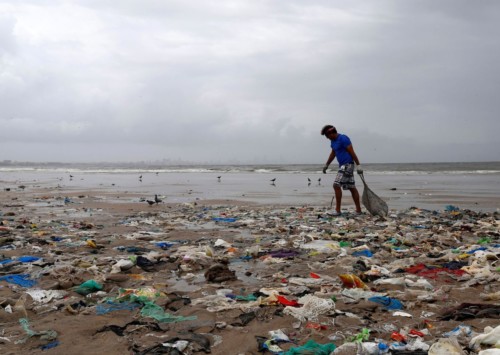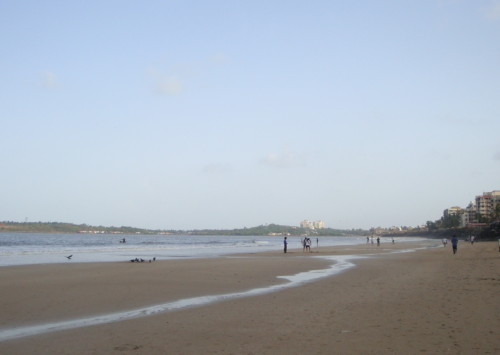Where is India in its target to phase out single use plastics?
According to the latest report by the Central Pollution Control Board (CPCB), only 14 of India’s 35 regional pollution boards filed information on plastic waste generation in 2017-18. How is India going to reach its target of eliminating single use of plastics if the states do not abide?
Kadam Wadwe, a coconut water vendor on Juhu beach, in Mumbai, Maharashtra has found a unique alternative to plastic straws. He now uses paper straws that he says is both environment friendly and pocket friendly. “After the plastic ban in the state last year it was really difficult for us to use plastic straws, as the young costumers themselves refused to take it after the ban. That is when I decided to use paper straws instead which is often appreciated by my customers,” says Wadwe.
Not only Wadwe but other vendors in the area too have switched to natural alternatives like leaves as packaging materials, wooden sticks instead of plastics for candy floss, hollow papaya stalks as straws etc. However, reports suggest that in spite of the ban, manufacturers and traders are still using plastics in the markets.
Siddha a local fruit seller in a municipal fruit market in Mumbai said that he started losing customers after he refused to provide plastic bags for storing vegetables. “The government just imposed the ban without providing us with alternatives. Now if my customers are not carrying any bag with them, what should I give them the vegetables in?” said the agitated vendor.
It has been a year since the Maharashtra government put a ban on single use plastics to fight plastic pollution in the region. It became the first state to put a ban on manufacture, usage, transport, distribution, wholesale and retail sale and storage and import of plastic bags. According to the Brihanmumbai Municipal Corporation’s (BMC) Environment Status Report 2017-18, plastic accounted for 3.2 pc of the approximately 7,500 tonnes of waste generated daily in Mumbai. The BMC had formed a blue squad to ensure that the ban is implemented successfully across the establishments.
Since the ban, the team has visited around 6, 95,000 establishments and has collected over 52,340 kg of plastic bags. Moreover, a total fine of INR 27.6 million has been collected from the offenders. In the last 10 months, the Pune Municipal Corporation (PMC) and the Pimpri Chinchwad Municipal Corporation (PCMC) have confiscated 56,151.6 kg of plastic items. The state reported a 40 pc drop in plastic waste in the seven months since the ban.
Maharashtra, Telangana, Himachal Pradesh and Tamil Nadu were the first four states in India to impose ban on single-use plastics. In Tamil Nadu, 86 tonnes of banned plastics were seized from 25,000 shops in January, which lowered to 24 tonnes in February and further lowered to seven tonnes in March.
In 2018, as the global host to UN World Environment Day, India had pledged to eliminate single-use plastic by 2022 with the theme ‘Beat Plastic Pollution’. However, at the recent United Nations Environment Assembly (UNEA) in Nairobi, between March 11 and 15, 2019, India pushed back its deadline to 2030.
“…We will address the damage to our ecosystems caused by the unsustainable use and disposal of plastic products, including by significantly reducing single-use plastic products by 2030, and we will work with the private sector to find affordable and environment friendly alternatives…” says the document available on the UNEA website.
Where is India in its goal?
India’s annual plastic consumption is expected to cross 20 million tonnes in 2020. Between 2010 and 2015, the plastics processing industry grew at a compound annual growth rate of 10 pc in volume-from 8.3 million metric tonne per annum (MMTPA) to 13.4 MMTPA, as per a 2017 study by Federation of Indian Chambers of Commerce & Industry (FICCI). By 2020, it is expected to grow at a CAGR of around 10.5 pc to reach 22 MMTPA. In plastic, the packaging sector is growing the fastest, registering a CAGR of 15 pc between 2010 and 2015, the study said. An increase in the consumption of plastics will almost certainly result in a rise in plastic waste.
According to a data provided by PlastIndia Foundation, a conglomeration of associations and institutions that deal in plastic, India consumes an estimated 16.5 million tonnes, about 1.6 million truckfulls, of plastic annually. Of this, 43 pc is plastic manufactured for single-use packaging material that will mostly find its way into garbage bins, the report said. The report further adds that 80 pc of total plastic produced in India is discarded.
The rising imports of plastic are a cause of worry. In January, it was reported that India’s plastic imports had increased from 12,000 tonnes in 2016-17 FY to 48,000 in the 2017-18 FY. While India has recycles a higher percentage of its plastic waste than most countries, 44 pc of its plastic waste is still not recycled. This happened due to a loophole which allowed import of plastic waste through Special Economic Zones (SEZs). However, the government on March 6, 2019, put a ban on this, but by the time the last ban was imposed, within the first quarter of the current financial year, 25,000 tonnes of plastic waste had already been imported.
The non compliant states
According to the latest report by the Central Pollution Control Board (CPCB), only 14 of India’s 35 regional pollution boards filed information on plastic waste generation in 2017-18. Thus, the CPCB estimate of plastic waste generated in India in 2017-18- 660,787.85 tonnes, enough to fill 66,079 trucks at 10 tonnes a truck-does not reflect the situation in more than 60 pc of India’s states and union territories.
Following this the CPCB has approached the National Green Tribunal (NGT) to enforce the implementation of plastic waste management rules by non-compliant states. On March 12, 2019, the NGT ordered all of them to ensure that reports are furnished to the CPCB by April 30, 2019. If the states fail in doing so, then a penalty of INR 10 million per month is to be paid to the CPCB, the NGT said. If India is planning towards beating the plastic pollution then just a ban is not the ideal way but coming up with alternative and sustainable solutions is what will free the country from the plastic menace.












